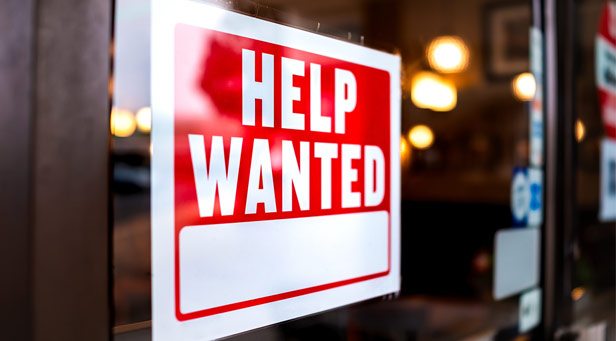News May 07, 2021
As Economy Recovers, Hiring Remains a Challenge
Employers, including those in the promo products industry, are having a hard time filling positions. Only 266,000 jobs were added last month, far below economists’ expectations.
Economists polled by Dow Jones predicted that the United States’ economy would generate 1 million new jobs in April.
The reality? 266,000 positions were added to non-farm payrolls last month, and the unemployment rate rose to 6.1%, according to the Labor Department.

Supply chain challenges, which promo has faced too, and the fact that employers are finding it difficult to hire enough workers were key factors that depressed hiring even as spending ramped up on the heels of a first quarter in which U.S. gross domestic product increased at an annually adjusted rate of 6.4%.
“Higher vaccination rates, fiscal stimulus and easing business restrictions are converging to support stronger spending across the U.S,” The Wall Street Journal reported. “But many businesses are reporting they can’t find enough workers, a phenomenon that could restrain economic growth in the coming months.”
With business restrictions easing, leisure and hospitality did the most hiring in April, adding 331,000 positions. Those gains were partly negated by losses in other sectors. Retail was down 15,000 jobs. Healthcare declined by 4,000 jobs. Temporary help employment shed 110,000 jobs. And manufacturing – hurt by supply chain problems that included chip shortages that led to the idling of some automotive factories – lost 18,000 positions.
Nonetheless, employers overall say they want to hire to capitalize on the strengthening economy, but are having trouble getting personnel to sign on. Companies in the promotional products industry are experiencing the problem.
“Labor availability has been a challenge,” says David Nicholson, vice chairman of Polyconcept, the parent company of Top 40 supplier Polyconcept North America (PCNA; asi/78897). “As the economic recovery has accelerated, suppliers are needing to hire additional workers for their production and warehouse operations. There are several contributing factors as to why suppliers are struggling with hiring, including competing with other industries that are also aggressively hiring.”
The Wall Street Journal cites additional reasons for the hiring challenges: “Millions of adults say they aren’t working for fear of getting or spreading Covid-19. Businesses are reopening ahead of schools, leaving some parents without child care. Many people are receiving more in unemployment benefits than they would earn in the available jobs. Some who are out of work don’t have the skills needed for jobs that are available or are unwilling to switch to a new career.”
The U.S. Chamber of Commerce thinks the additional $300 in unemployment insurance that unemployed people are receiving through the federal government each week is a primary reason that employers are struggling to hire. It plans to lobby the White House and Congress to sunset the payout, which is scheduled to run through early September.
“The disappointing jobs report makes it clear that paying people not to work is dampening what should be a stronger jobs market."
— U.S. Chamber (@USChamber) May 7, 2021
See the full statement from our EVP @NeilBradleyDC on this morning's @BLS_gov jobs report: https://t.co/uE1557IKt3 pic.twitter.com/HIeDFwoZb5
The White House says there isn’t viable evidence to suggest that the additional federal unemployment benefit is disincentivizing people from getting back to work.
Some politicians disagree.
“What was intended to be a short-term financial assistance for the vulnerable and displaced during the height of the pandemic has turned into a dangerous federal entitlement, incentivizing and paying workers to stay at home rather than encouraging them to return to the workplace,” said South Carolina Gov. Henry McMaster, who has ordered his state’s Department of Employment and Workforce to withdraw from the federal government’s pandemic programs by the end of June.
